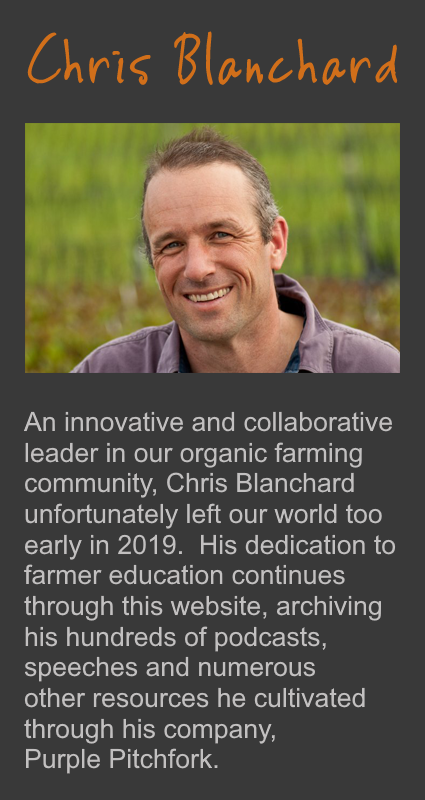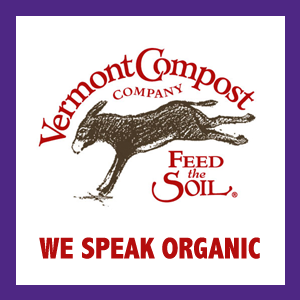I like farming toys as much as the next farmer, and when you ask me, “What should my next investment be for my farm?” I’m as tempted as anybody to provide a listing of various configurations of metal and grease that, if properly applied, would be the perfect tool to address the situation.
But more often than not, I’d be wrong.
More often than not, you’d be better off investing your time and energy into…
Improving the information you have about your farm - How much does it cost you to grow a pound of carrots? What are your fixed costs per acre of field production? How long does it take your crew - average, high, and low - to harvest a hundred bunches of kale? What’s your average per-acre (or per-square foot) yield on carrots? What’s your current ratio, and how does that compare to last year? How much did you spend to grow the vegetables that went into your CSA share?
Improving the information you have about your craft - What don’t you know about growing vegetables, feeding chickens, or raising cows? If you don’t know the basics of your craft, figure out where you can go to learn it - and keep in mind that this might not be your normal round of conferences! State and regional producer associations often have workshops about improving the fundamentals by people who are focused on fundamentals over philosophy. Take a class. Attend field days.
Creating systems - You already have ways that you get things done. What can you do to make them better? If there are places where things consistently go wrong, spend time digging in there and figuring out what you need to make things right - more often than not, it’s going to be a minor investment or a change in procedures.
Cleaning and clarifying workspaces - It’s such a small thing, but working with even slightly chaotic workspaces and storage areas takes a huge toll on productivity and worker perspective. Clean, bright work areas with obvious storage spaces for tools can ease workloads - and perceived workloads - tremendously. If you’ve ever had a worker spend two hours during a rare dry spell looking for the right piece of metal to make the transplanter work (that was me), or torn your hair out with frustration while a crew tried to find a harvest knife for the last worker, you’ve seen the incredible toll this can take on a farm’s bottom line.
Close open loops - Farms tend to be filled with almost-finished projects. Wrap them up and get rid of the extra parts, drop them off the to-do list, and get them out of your head. You’ll free up mental energy to focus on the work that makes a difference, and the physical space that keeps your workers (and you) from having to work around, under, and over that undone thing and the junk that’s hanging around to get it done.
What can you do with the time you would have spent researching new toys? What if you spent the money you were going to spend on something new on refining what you’ve got?
But more often than not, I’d be wrong.
More often than not, you’d be better off investing your time and energy into…
Improving the information you have about your farm - How much does it cost you to grow a pound of carrots? What are your fixed costs per acre of field production? How long does it take your crew - average, high, and low - to harvest a hundred bunches of kale? What’s your average per-acre (or per-square foot) yield on carrots? What’s your current ratio, and how does that compare to last year? How much did you spend to grow the vegetables that went into your CSA share?
Improving the information you have about your craft - What don’t you know about growing vegetables, feeding chickens, or raising cows? If you don’t know the basics of your craft, figure out where you can go to learn it - and keep in mind that this might not be your normal round of conferences! State and regional producer associations often have workshops about improving the fundamentals by people who are focused on fundamentals over philosophy. Take a class. Attend field days.
Creating systems - You already have ways that you get things done. What can you do to make them better? If there are places where things consistently go wrong, spend time digging in there and figuring out what you need to make things right - more often than not, it’s going to be a minor investment or a change in procedures.
Cleaning and clarifying workspaces - It’s such a small thing, but working with even slightly chaotic workspaces and storage areas takes a huge toll on productivity and worker perspective. Clean, bright work areas with obvious storage spaces for tools can ease workloads - and perceived workloads - tremendously. If you’ve ever had a worker spend two hours during a rare dry spell looking for the right piece of metal to make the transplanter work (that was me), or torn your hair out with frustration while a crew tried to find a harvest knife for the last worker, you’ve seen the incredible toll this can take on a farm’s bottom line.
Close open loops - Farms tend to be filled with almost-finished projects. Wrap them up and get rid of the extra parts, drop them off the to-do list, and get them out of your head. You’ll free up mental energy to focus on the work that makes a difference, and the physical space that keeps your workers (and you) from having to work around, under, and over that undone thing and the junk that’s hanging around to get it done.
What can you do with the time you would have spent researching new toys? What if you spent the money you were going to spend on something new on refining what you’ve got?




 RSS Feed
RSS Feed
